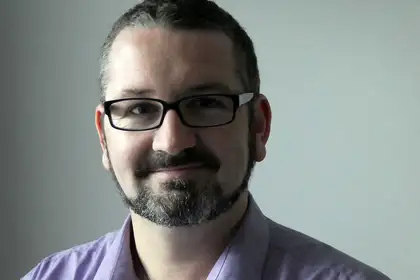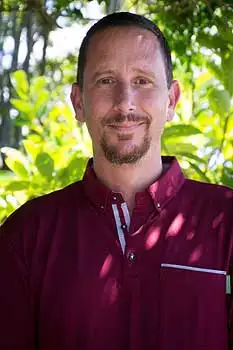
Sociology PhD candidate Kalym Lipsey, who has organised a panel discussion on current efforts to rehabilitate prisoners.
The size of New Zealand’s prison population, and future models to accommodate it, are hot button issues – but what is the justice system doing to ensure those behind bars are being rehabilitated? A panel discussion at Massey’s Auckland campus this week explores some of the issues and options.
Titled Current Support in the New Zealand Criminal Justice System, the discussion on Wednesday May 23, features three speakers who have worked with incarcerated, recently released prisoners and whānau members – all deploying a range of tools from puppetry theatre to yoga.
Speakers and topics are: Dr Rand Hazou (Massey University) - Unbend the Mind: Staging Puppet Antigone at Auckland Prison; Aperahama Anihana (Māori Prison Support Services) – Let’s build a Habilitation Centre and not a Prison!and Dr John Sinclair (Howard League) - Teaching Yoga in New Zealand Prisons.
During the discussion, speakers will share their insights from work they have done in prisons to bring new forms of rehabilitation with the ultimate aim of empowering inmates to seek a better life outside prison and to reduce recidivism.

Dr Rand Hazou, one of the speakers.
PhD candidate and human rights researcher Kalym Lipsey, who is organiser for the event, says he hopes the discussion will be an opportunity for the wider community to “explore how we can continue to push for appropriate reform while still supporting those currently in the system.
“The recent surge in the volume of conversations about the big issues in New Zealand’s criminal justice system presents a question: at times when significant decisions are at the forefront of discussion, does a passion for change overwhelm the demand, desire and need for programmes and support while any changes are considered?”
Mr Lipsey, who spent one year in prison in 2011 for tax evasion, says his own experiences gave him the inspiration and sense of direction to study human rights and, in particular, prison rehabilitation and reform. He has completed a Bachelor of Arts and a Master of Arts – both in sociology – at Massey’s College of Humanities and Social Sciences.
As a researcher, he discloses himself as “formerly incarcerated” but hopes disproportionate attention is not given to his past. He feels his experiences nonetheless inform his identity and purpose as a researcher, lending authenticity and credibility to his work.
He was inspired to organise a public discussion of prison issues; “due to an unease I was feeling with current conversations in this field”, he says.
“I’ve steadily increased my involvement in activism around justice and prison reform in the last five years and fully support the work of some exceptional groups pushing for much-needed reform,” he says.
“However, I question whether we leave a gap in our conversation by focussing on the big issues such as whether the ‘mega-prison’ at Waikeria should be built.”
This week’s event has been organised to ask the questions: does a disproportionate allocation of time spent discussing the big issues have a detrimental impact on discussions around how those currently in the system can be supported and rehabilitated? How do we now operate in ways that signal, or at least acknowledge, the significance of both reform and adequate support and programmes?”
Mr Lipsey’s PhD in sociology is looking at ‘where to now’ questions for human rights, specifically “at the point of rights fulfilment and the intersectionality of racism, ethnicity, law, justice and resource allocation.
“I’m particularly interested in mechanisms that can address breaches of the state’s human rights obligations. These questions are being answered through a nationwide quantitative longitudinal study of New Zealander’s perceptions and expectations of rights and rights fulfilment, and how they cope when their rights are breached. The justice and social welfare systems are the two major case studies.”
The discussion is at 6.30pm, Sir Neil Waters Building (SNW100), Massey University, Albany, Auckland.
For more information contact Kalym Lipsey: k.lipsey@massey.ac.nz